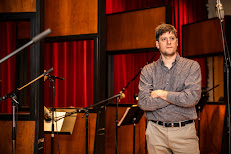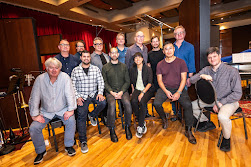Here's one of my favorite albums of Autumn 2022.
 |
| Photo: Dahlia Katz |
His latest album, "Twelve" (TPR Records), features a 12-member ensemble (13 on one track) that includes an impressive lineup of Canada's most exciting musicians. The six original pieces, all but two over 11 minutes, not surprisingly cover a wider swath of music of musical territory. One can hear the influence of Maria Schneider on the first track, "Song for Lia"; it's in the expansive melody, the use of wordless vocals, in how the solos (alto saxophonist Allison Au and guitarist Ted Quinlan) rise up out of the section playing, and the active but never intrusive rhythm section. "The Nagila Mayster" is playful, rhythmically active, with intriguing call-and-response, and fine vibraphone work from Michael Davidson. Listen below how the music evolves over 14 minutes, how Lemish arranges the various "voices" in the ensemble, slowly building the intensity, and not afraid to stop and start. After a slow and majestic "chorale" led by the brass augmented by the vibes, the tempo jumps up , slows down, and leads to the leader's delightful piano solo.
 |
| Photo: Dahlia Katz |
If you're like me and enjoy adventurous large ensemble music, go find "Twelve". Noam Lemish has created one of 2022's most delight-filled recordings. The playing is crisp, the arrangements intelligent and thoughtful, and the melodies all stand out. One cannot ask for more from an album other than one more like this, please!
For more information, go to www.noamlemish.com/noam-lemish-12tet. To hear more and to purchase the album, go to https://noamlemish.bandcamp.com/album/twelve.
Enjoy "The Nagila Mayster":
Songs and personnel:
-
Song for Lia
-
The Nagila Mayster
-
Beethoven’s 7th Visit to Romania
-
Steals on Steeles
-
Between Utopia and Destruction
-
Rebirth
Noam Lemish - piano & compositions
Terry Promane - musical director
Kevin Turcotte - trumpet & flugelhorn
Jim Lewis - trumpet & flugelhorn
Allison Au - alto saxophone
Mike Murley - tenor saxophone & soprano saxophone (2,3)
Kelly Jefferson - tenor saxophone & soprano saxophone (5)
William Carn - trombone
Karl Silveira - trombone
Laura Swankey - vocals (1, 2)
Ted Quinlan - guitar
Michael Davidson - vibraphone (2, 3, 4, 6)
Justin Gray - double bass
Derek Gray - drums & percussion
Choir ("Beethoven’s 7th Visit to Romania"): Michelle De Palma, Sanja Dejanovic, Aliyah Guthrie, Yuval Jarus Hakak, Alexandra Kapogiannis, Allison Long, Dulce Martinez, Sarvi Seivani, Nitish Sharma, Marie Tossios, Jackson Welchner, Yulina Wong, Samira Yeo
All compositions & arrangements by Noam Lemish (ASCAP)
Terry Promane - musical director
Kevin Turcotte - trumpet & flugelhorn
Jim Lewis - trumpet & flugelhorn
Allison Au - alto saxophone
Mike Murley - tenor saxophone & soprano saxophone (2,3)
Kelly Jefferson - tenor saxophone & soprano saxophone (5)
William Carn - trombone
Karl Silveira - trombone
Laura Swankey - vocals (1, 2)
Ted Quinlan - guitar
Michael Davidson - vibraphone (2, 3, 4, 6)
Justin Gray - double bass
Derek Gray - drums & percussion
Choir ("Beethoven’s 7th Visit to Romania"): Michelle De Palma, Sanja Dejanovic, Aliyah Guthrie, Yuval Jarus Hakak, Alexandra Kapogiannis, Allison Long, Dulce Martinez, Sarvi Seivani, Nitish Sharma, Marie Tossios, Jackson Welchner, Yulina Wong, Samira Yeo
All compositions & arrangements by Noam Lemish (ASCAP)













